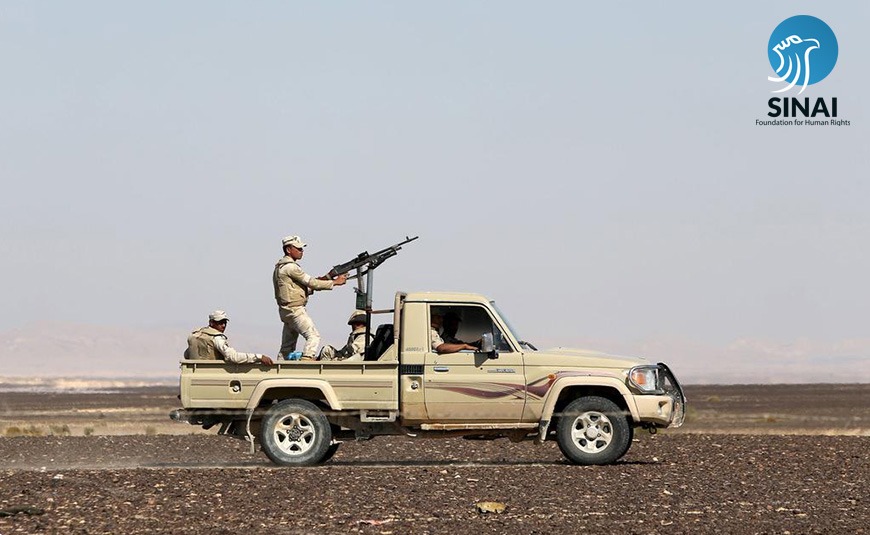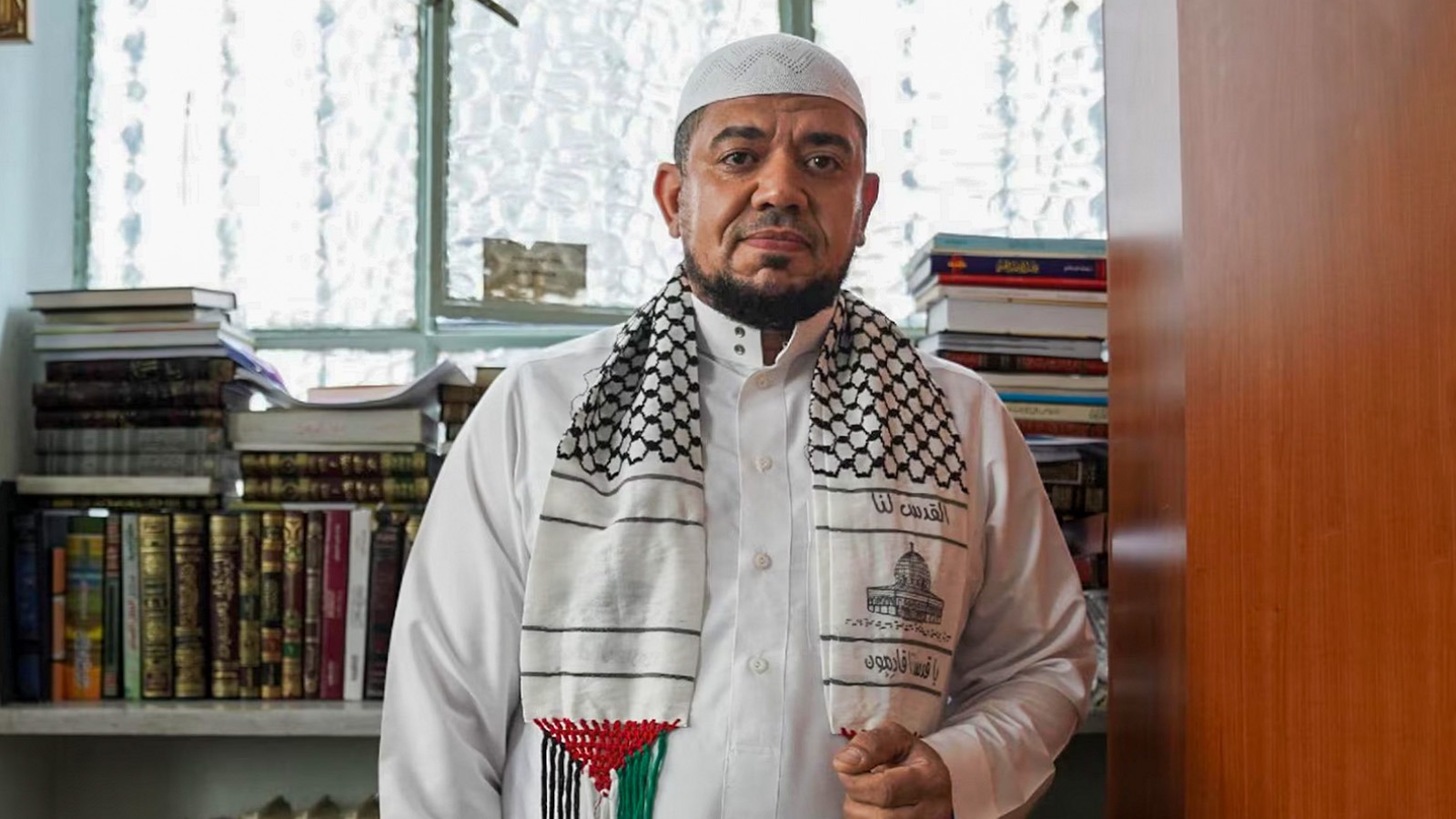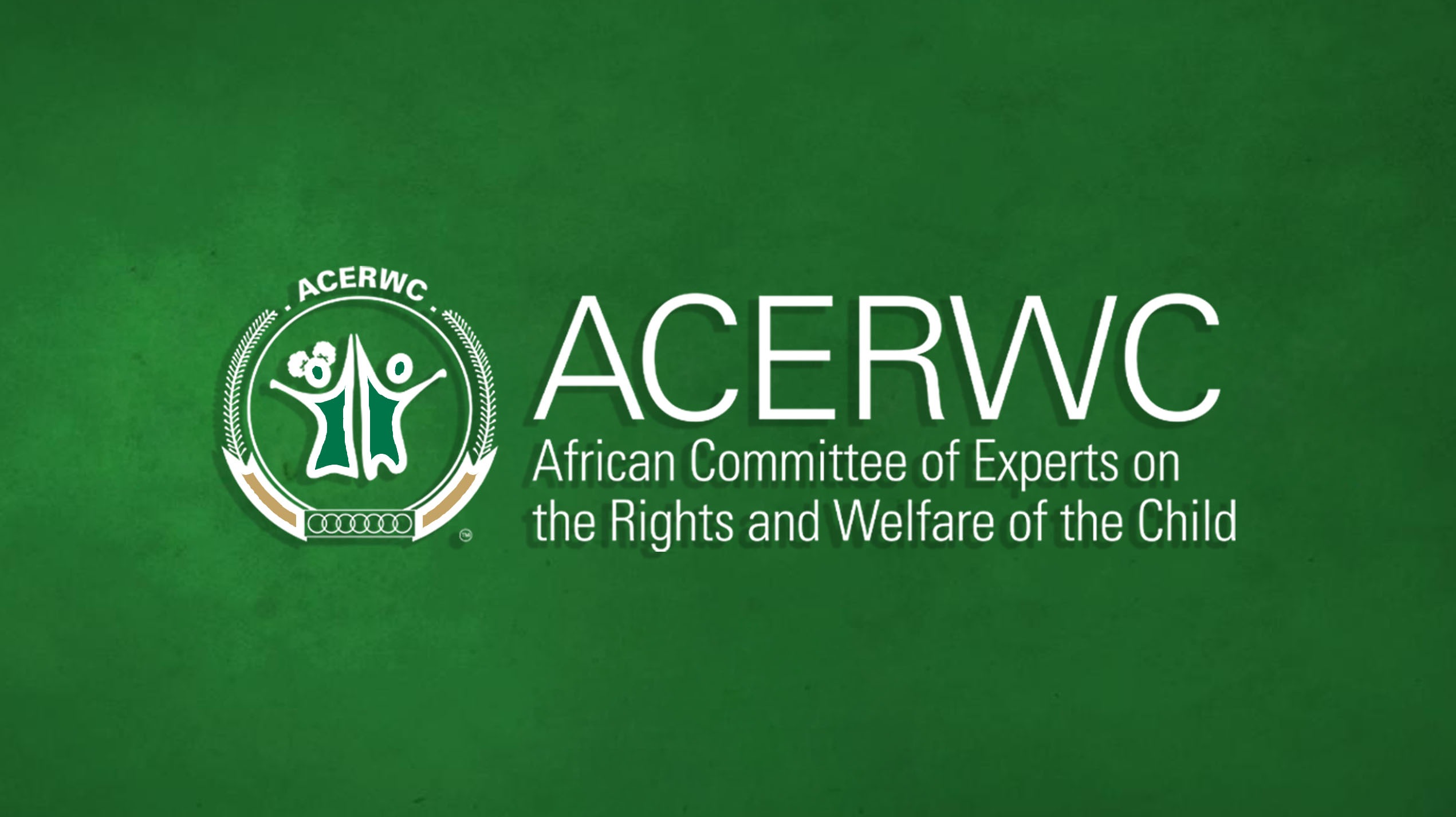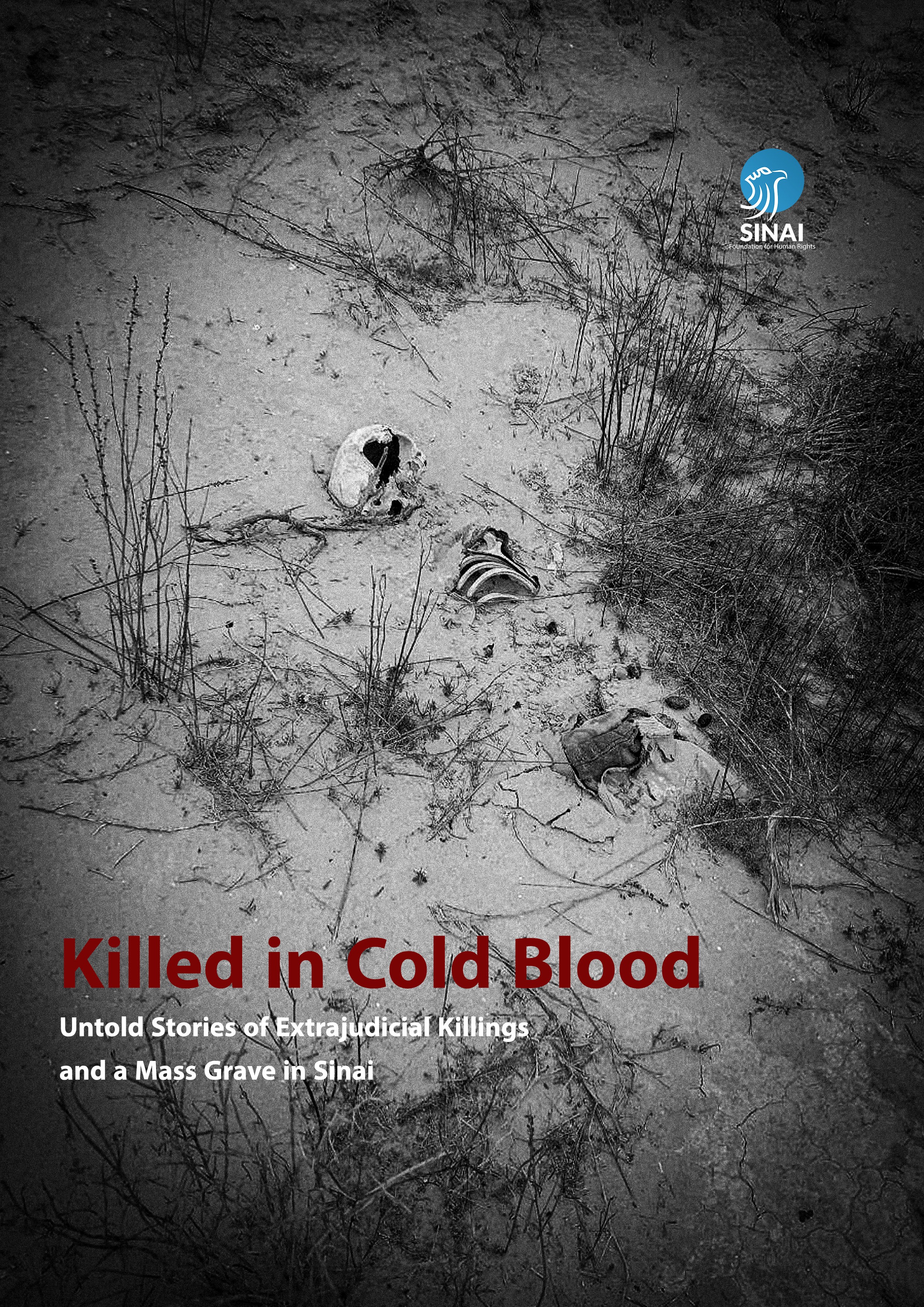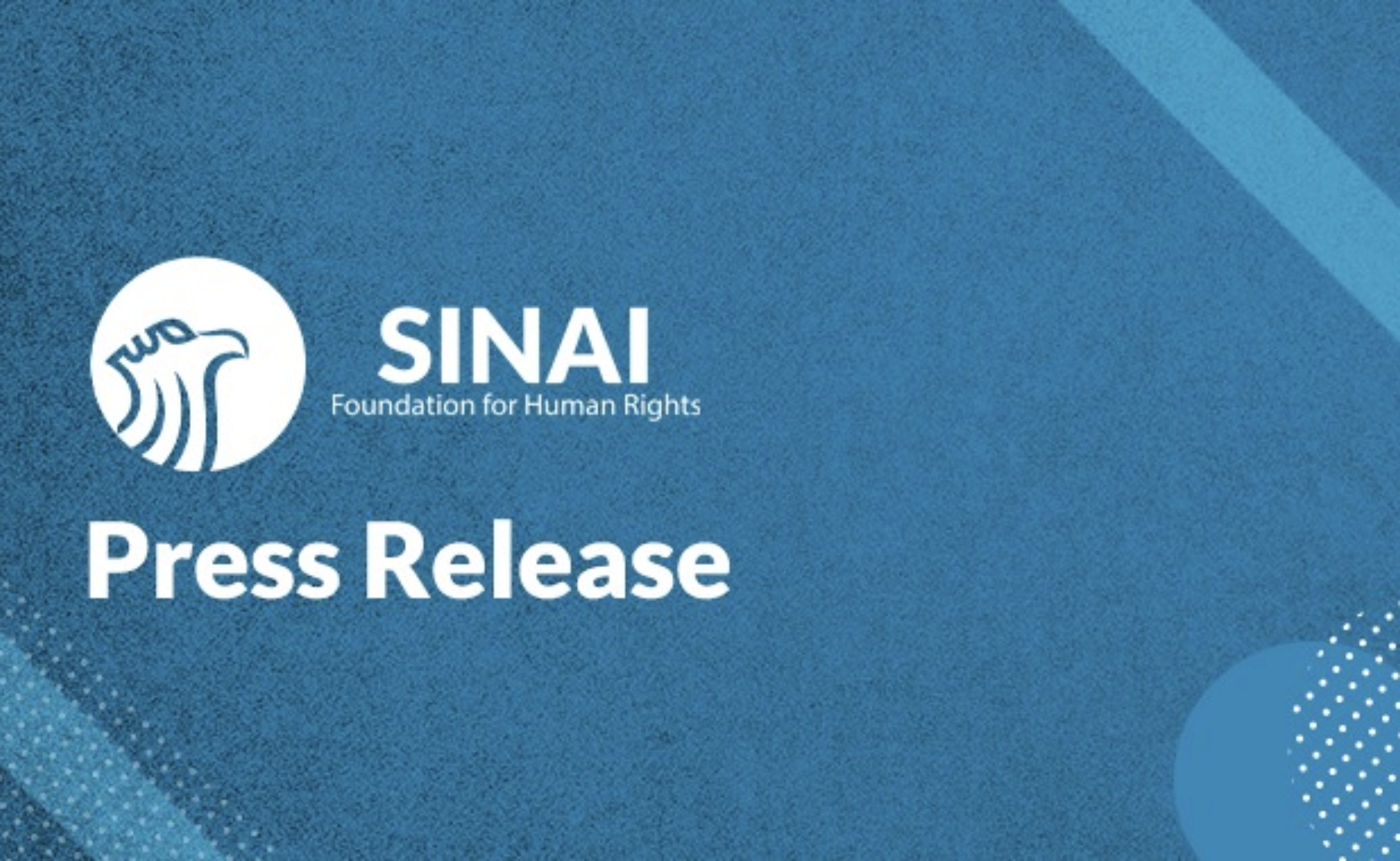“It’s a disaster I swear. We don’t feel safe in our houses, our cars, or even out on the street where people get killed or abducted. Terrorists set up ambushes on the international road then search cars and check people’s ID cards. Police and military ambushes are also everywhere. This entire situation could make even the most patient person lose their mind.”
*Part of a statement made by an al-Dawaghra tribe local, refuting ISIS’s allegations that the reason behind killing civilians is the citizens’ cooperation with security forces.
Summary:
During April, the Sinai Foundation for Human Rights recorded 8 abuses in multiple parts of Sinai, 6 of which were extrajudicial murders of unarmed civilians by conflicting parties. To investigate those incidents, the foundation team met with 9 eyewitnesses who gave the testimonies published in this report about exclusive details of the abuses.
Three abuses took place during the first week, two of which happened in the Gilbana area in western Sinai, and one happened in an unknown location in North Sinai. Two farmer brothers were the victims of one of those abuses. A civilian was killed in one of the other two incidents for allegedly being in cooperation with local pro-government popular forces. The third incident witnessed the abduction of 3 farmers from one family after the abductors broke into their home.
During the second week, the Sinai Provence group announced the murder of two civilians in an unknown location in Sinai, claiming that the victims had been in cooperation with security forces, which contradicts testimonies acquired by the Sinai Foundation, which state that the victims were not in cooperation with Egyptian law enforcement forces.
And during the third week, ISIS stole a civilian pickup truck belonging to a merchant near Bir al-Abd in Northern Sinai.
During the fourth week of April, the Sinai Foundation recorded the murder of a civilian by gunfire shot from a military ambush in al-Aqour village in al-Sheikh Zwayed, as well as the murder of a woman and two men by ISIS in the city of al-Arish.
Details of the abuses:
Egyptian authorities and law enforcement forces abuses:
Two potential extrajudicial murders in two separate locations in Sinai
Arbitrary deprivation of the right to life is a human rights violation. The right to life is guaranteed in article 3 of the Universal Declaration of Human Rights and article 6 of the International Covenant on Civil and Political Rights, and no special circumstances can be used as an excuse to violate that right. During the first quarter of 2021, two extrajudicial murders were committed by Egyptian government forces. The first incident took place on 15.01.2021 after “Hassan” military ambush in al-Thahir village southern al-Sheikh Zwayed, fired at a Shepherd, killing her. The second incident took place on 26.02.2021, and its victim was an Al-Azhar Institute employee in al-Sheikh Zwayed who was killed while driving with his family when they were shot by a security campaign.
During April, the Sinai Foundation followed up on the murder of 3 civilians in 2 separate incidents. The first incident took place in late March, but its details were revealed in the beginning of the first week of April.
On 01.04.2021, the Sinai Foundation acquired information of a possible extrajudicial murder whose victims were two brothers, Khaled Mahmoud Hassan Aiad, 22, and Husam Mahmoud Hassan Aiad, 20. They were killed by gunshots fired by security forces during a security campaign in Gilbana, western Sinai.
The Sinai Foundation got in contact with an eyewitness, who said that he saw both young men working in their farm in southern Gilbana, western Sinai. That was on 29 March 2021, just one day before their bodies were discovered in the farm with several gunshot wounds in different parts of their bodies.
The witness added that he saw four armored military vehicles later in the afternoon passing by his farm, then stopping a little way off the side road, close to the area where the farms are. He then saw men get out of the vehicles and follow the tracks of a motorcycle that belonged to the brothers who were then working at the farm. A little while later, he heard heavy gunfire, but he did not realize what was happening and thought that they were warning gunshots like the ones fired by military campaigns when passing through an open area. The witness continued, saying that due to the security and military presence that lasted for around an hour and a half, none of the farmers or citizens went where the campaign was, in fear of the gunshots being fired every now and then.
The eyewitness continued his testimony, saying that the next day, 30 March, he noticed unusual movement of locals in the farm where the brothers were. Then one of the locals told him that they found the two young men killed by gunfire. He pointed to the fact that the military campaign stopped there the afternoon of the previous day, which points to them having killed the brothers, thinking the brothers had been armed (according to the witness). He continued, saying that he saw empty military bullet casings where the incident happened. The witness confirmed that local elders in close relation with the government passed an apology from the military onto the victims’ family days after the incident, passing on that what happened was an unintended mistake, and promised that the government would financially compensate the family.
On another note, social media platforms witnessed a lot of sympathy with the victims’ family. Many locals posted written statements about the two young men, describing them as martyrs. But those posters avoided mentioning whoever is responsible for the murder, which usually happens every time civilians are shot and killed by the Egyptian military, in fear of being labeled as opposing to the military and the dangers that could follow such labeling.
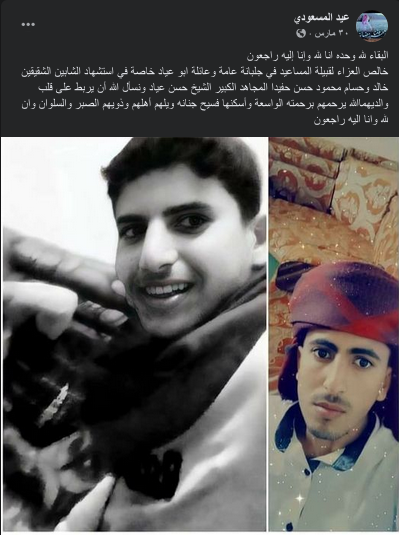
The eyewitness report states that the brothers posed no threat to the security forces, and nothing they did could be seen as a threat that required deadly force to deal with. On the contrary, it is obvious that there was disproportionality in power -in case of a clash- between the two parties, as the victims were only two individuals against a security force of close to 30 soldiers, which qualifies this incident as a possible extrajudicial murder by members of an official force.
On 24.04.2021, Gunfire shot from an ambush in the preparatory school in al-Aqour village in al-Sheikh Zwayed led to the death of a young man in his twenties called Abdul-Rahman Ahmed Ali “Abu-Farha” al-Aqour. His body was taken to al-Sheikh Zwayed General Hospital, then to al-Arish Central Hospital, then to Port Said to be examined by the coroner for a burial permit, which took 3 days after the murder.
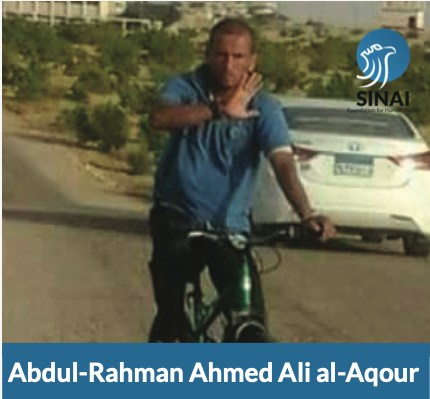
Talking to the Sinai Foundation, an eyewitness from the village said: “Abdul-Rahman Abu-Farha was a service worker with the peace keeping forces in al-Goura airport. He had time off and came home to see his family and have Iftar with them. Abdul-Rahman is married and has two kids. The second day of his time off, it is known that before leaving the village or coming in you need to take permission from the soldiers at the ambush by the preparatory school at the outskirts of the village, he took permission to leave the village at noon. He had only taken a few steps when they shot him. We heard gunshots, and many of the locals went to see what had happened. We found Abdul-Rahman bleeding from his chest. People started screaming at the soldiers of the ambush, but the soldiers did not react. What we understood from the soldiers is that the soldier who approved Abdul-Rahman’s request forgot to tell his fellow soldier positioned on top of the school, so the school soldier shot Abdul-Rahman, may his soul rest in peace. The same ambush had done the same thing before with Nidal Muslim Hassan, who they killed about 7 months ago while on his way home after playing football with other young men from the village.”
The witness added: “The village people are all known. There are not many of us. Only 15 families, and the rest were displaced. No one goes in or out of the village without their name being recorded at the ambush. There is no need for all the restrictions imposed on the people. The village is surrounded by ambushes, so it’s supposed to be safe. Why undermine people’s lives and why are there no consequences for the soldiers who shoot at people? And why would they shoot him in the heart? Why not just in the leg? Even if he was suspicious!
If they had held the soldier who shot Nidal accountable, Abdul-Rahman would not have been killed and his kids would not have been orphaned and had their lives changed forever. And the people are of course scared to say who killed them in investigations so they would not get in trouble with the military. They think that saying nothing and getting to bury their child is better than him being held in a morgue for months for an investigation. They also don’t have proof that the military killed them, and we all know the fate of those who make accusations against the military.”
The eyewitness report matched what was published by a local al-Sheikh Zwayed page on Facebook which confirmed the unjustified shooting of the victim by al-Aqour military ambush, killing him.
According to the information revealed by the witness in his testimony, the victim was known to the ambush and had acquired prior permission to get through the military barrier, which is the usual security routine followed by the locals living in the area in dealing with military barriers. He also did not do anything that could be seen as a threat that justifies the use of gunfire. There were no armed clashes, and there were also no hostile elements in the area at the time, which makes this action a possible extrajudicial murder.
ISIS-affiliate group, Sinai Province, abuses
Extrajudicial killings in various areas of Sinai
Extrajudicial murder is a gross violation of Human Rights that is recurring in Sinai, and it is an inherent practice by ISIS. The Sinai Foundation recorded 3 extrajudicial murders in Sinai during April. The first incident took place on 05.04.2021 where the ISIS-affiliate Sinai Province group killed a citizen called Mohamed Suliman Silmy Abu-Naqiz from al-Trabin tribe, with the claim that he was part of the awakening movement, which is the name the group gave members of the Sinai Tribal Union supporting the military.
According to a visual recording shared on multiple Twitter accounts by the Sinai Province group on 05.04.2021, the murder of Mohamed Abou-Naqiz was committed by a masked group member in traditional clothes typically worn by the people of Sinai who shot the victim in the head with a Kalashnikov weapon after forcing him to dig his own grave. The recording did not show the time of the victim’s execution. The victim’s family and the authorities have also not been able to find his body.
The group stated in its release about the incident that Mohamed had been captured 5 months prior, and that he had been a member of the awakening movement, which is a name given by the group to members of armed civilian groups supporting the Egyptian military.
The Sinai Foundation for Human Rights met with a member of al-Trabin tribe, who said: “About 5 months ago, Mohamed went to make a phone call on top of a big hill people call “Qoz al-Ersal”, somewhere close by al-Agraa village, to find mobile signal, because signal is very weak in the area. He went alone with a motorbike. That area is considered a middle ground between the takfiris and the Tribal Youth Union. Members of the Tribal Youth Union thought he was a member of ISIS, so they shot at him, but he ran in fear. Since that day, no one’s heard anything about him. He is not a member of either group. He was just in the wrong place, so both groups were suspicious of him. The poor man!”
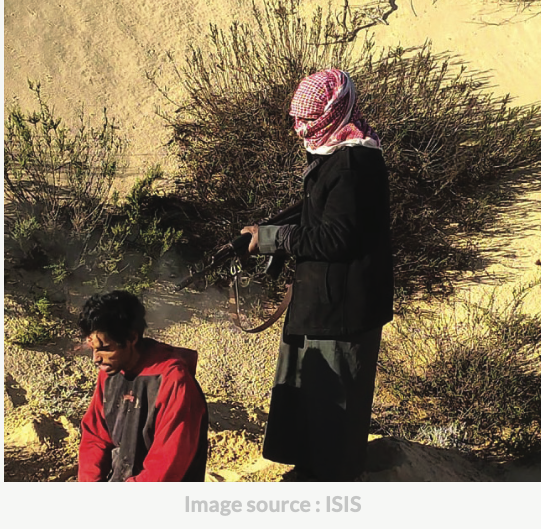
On 11.04.2021, the ISIS-affiliate Sinai Province group admitted in a piece of visual content broadcasted by their news agency, Amaq, to killing two citizens, Mohamed Ibrahim Hamdan, 22, from Mosafaq village, and Suilem Mohamed Suilem Mansour, 44, from Salmana village, both in Bir al-Abd. The content included scenes where one of the victims dug his own grave and an unmasked member of the group shot the victim from behind. The second victim was also killed by gunfire. The victims’ families have not been able to find their bodies till now.
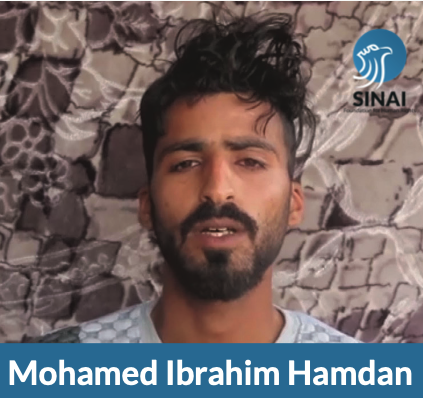
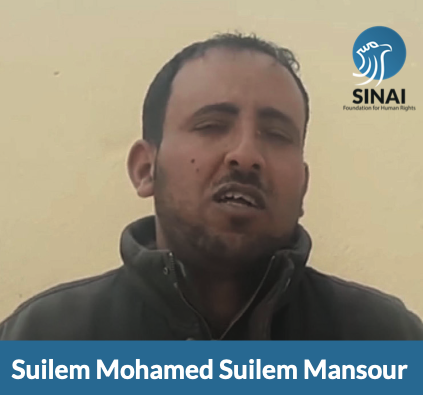
The content revealed two confessions that are likely taken from the victims by force, in which they reveal their cooperation with the military. Many people pointed to the contradictions in those confessions, and that what the two said is different from what is known about them.
Our field team met with a local citizen from al-Dawaghra tribe, who said: “The two martyrs were from our tribe. They had been abducted about 43 days before the Takfiris published the video. Mohamed worked as a fisherman in al-Bardawil lake. The Takfiris abducted him and his father and took them from their car in the middle of the village of Musafaq. My heart broke when I saw him in the video yesterday. I swear he does not know anyone in the military or the police. A very simple guy who did nothing wrong and died for nothing. We still do not know anything about his father, Hajj Ibrahim.
As for Suilem, he was taken from his home in Salmana village. Suilem worked as a fish salesman. He had a place where he sold fish, and everyone in the area knew him. I saw him in the video being forced to say those things about driving officers with his car. I swear Suilem did not even own a car! He had a small pickup truck he used to transport the fish, and no officer has ever been in that truck.”
He added: “It’s a disaster I swear. We do not feel safe in our houses, our cars, or even out on the street where people get killed or abducted. Terrorists set up ambushes on the international road then search cars and check people’s ID cards. Police and military ambushes are also everywhere. This entire situation could make even the most patient person lose their mind.”
We spoke with an al-Sadat village local in Bir al-Abd and asked him about the reasons behind people’s cooperation with security forces, he said: “Some young people cooperate with the military for different reasons. Some of them want to serve their country, or for power. But many people choose peace and to stay away from trouble. Many people only deal with security forces mainly for transporting water or delivering food to the ambushes. Officers sometimes ask them for things, and to avoid conflict, they transport water or food to the ambushes, but they do not go on any campaigns with the military. The problem is, the Takfiris see even transporting water as a reason for murder. They threaten people because they are weak and to spread fear and terror among the people. The military is supposed to secure the villages well. Those on the international road go through many ambushes, but behind the villages is open space and it’s not well-secured.”
On another note, The Sinai Foundation team spoke with an Amouria village local in eastern Bir al-Abd where on 25.03.2021, 15 men were abducted by ISIS with the claim of their cooperation with the military, who said: “What we saw was terrifying. The fates of three of those abducted from the village are still unknown. ISIS released 12 of them, but those three are nowhere to be found. We fear their fate being like that of those we see on the internet. Everyday when people get together, they ask if anyone has seen anything on the internet. I swear their families are devastated. And those abducted were the breadwinners of their families. They are all poor fishermen who did nothing wrong.”
According to what the Sinai Foundation for Human Rights recorded, during the period between 01.01.2021 and 16.04.2021, the number of abductions and murders of civilians by the Sinai Province group increased. The foundation recorded the murder of 10 civilians and abduction of 20 others by the group in different incidents that took place in North Sinai. One of those incidents took place in al-Shallaq village in al-Sheikh Zwayed on 05.02.2021 and its victim was a 16-year-old boy, claiming that he was in cooperation with security forces. One of the village locals described the body of the boy after it had been found as: “His head was barely holding on to his body with a piece of skin.”
On 28.04.2021, ISIS abducted a woman and two men after members of the Sinai-Province group snuck into al-Amal neighborhood in southeast al-Arish, less than 3 kilometers away from Battalion 101, which is the headquarters of the anti-terrorism department in North Sinai.
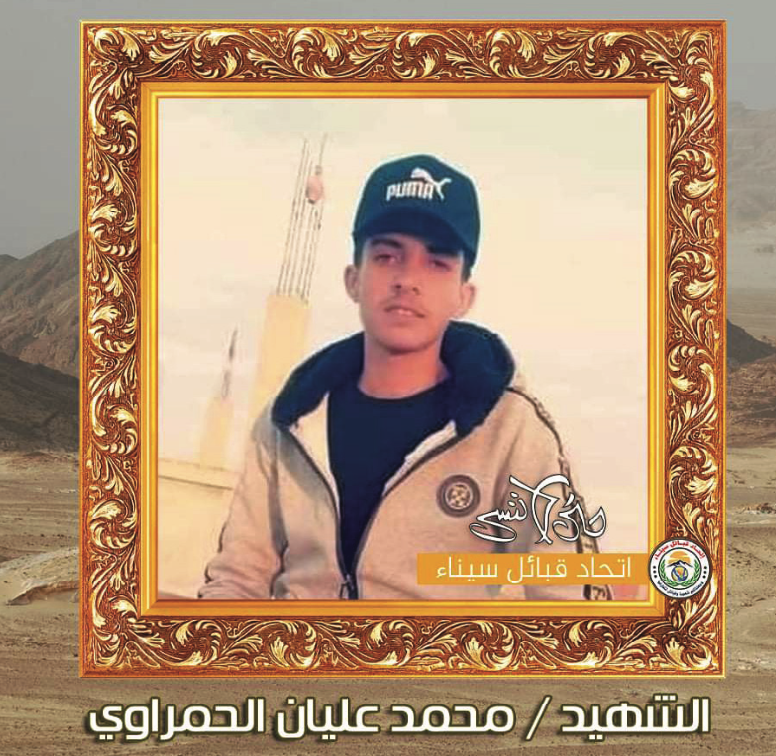
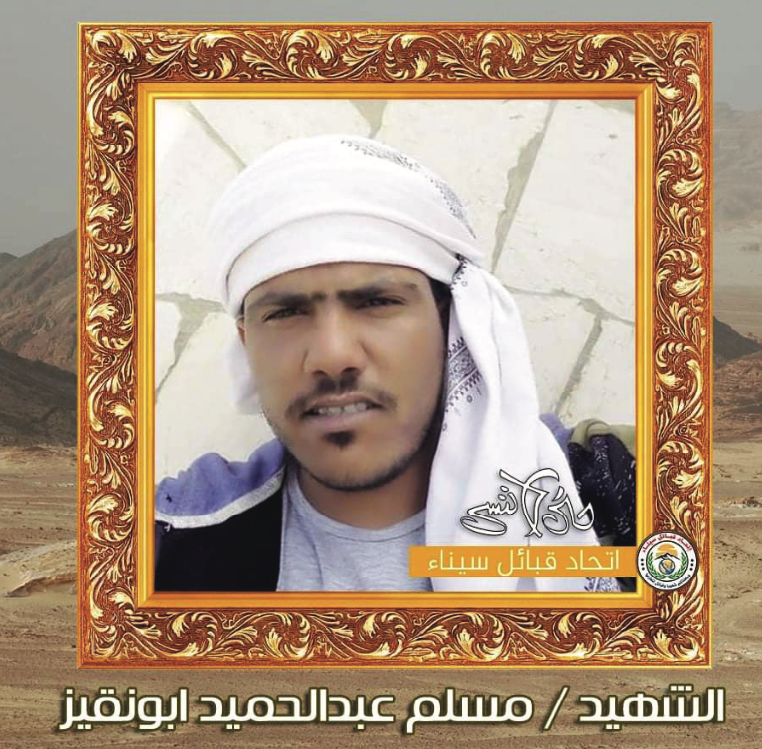
According to data acquired by the Sinai Foundation, the victims are:
-
Dawaba Saleem Salim Suliman, 40, killed by gunshots that penetrated beneath the neck from the back, bruises under the eye and facial abrasions were also found.
-
Muslim Abdul-Hamid Salman Salim, 28, killed by gunshot to the back of the head, fractures in the skull and abrasions on the hands and legs were also found.
-
Mohamed Alian Salman Salim, 20, killed by two gunshots to his front side from above, lacerations on his jaw bones were also found.
The local popular armed forces allied with the government in its conflict with ISIS, the Sinai Tribes Union, later released a statement mourning the two men, describing them as heroes, in what could be a sign that the two men were in cooperation with it in its war against ISIS.
The Sinai Foundation met with a man from al-Trabin tribe, many of whose men are involved with the Sinai Tribes Union, who said: “At Suhoor time, about 11 armed Takfiris came into the neighborhood. No one knows how they made it into the neighborhood, as it is surrounded by ambushes. It is strange that no one spotted them because there were many of them. They went to certain houses after spreading out. They were masked, carried machine guns, and wore clothes that resembled that of the military. They went to Mohamed Alian al-Hamrawy’s house, he was from al-Sawarka tribe, and pulled him outside of the house. Two others went to Muslim Abdul-Hamid Abu-Naqiz’s house and took him and a woman named “Dawaba”, also from al-Naqizat tribe. They went to two other houses, one of them belonged to a member of al-Trabin tribe and the other to a member of al-Malalha tribe and asked about them but they were not home. They threatened the people with guns so they would not speak or make loud noise, then left the same way they came in, spread out, with the abducted among them. The next morning people went to check what had happened. People tried to follow the Takfiris by the eastern end of the village, they found the bodies of all three, shot and dumped not far from the village. People then reported the incident to the security forces, but nothing happened. No one moved to see what happened, and no one cared other than the victims’ families who had earlier moved from the neighborhood and had come back not too long before what happened.”
According to this information, the woman killed by the group was not part of any activity and sided with neither of the conflicting parties, and therefore she is a civilian who has immunity from conflicting parties and should be protected and unharmed by them. That did not happen in this case, where a civilian whose only fault was being related to one of the fighters who sided with one of the conflicting parties. It is likely that the group killed her to satisfy the desire for revenge and to spread fear in the ranks of civilians.
The abduction of farmers in Gilbana village in western Sinai
The International Humanitarian Law prohibits strategized abductions and enforced disappearances. The United Nations declaration on enforced disappearances, unanimously approved, states that enforced disappearances are a violation of a range of rights, including the right to recognition as a person before the law, the right to liberty and personal security, the right not to be tortured or treated or punished in an inhuman or degrading way, and it also states that they violate the right to life, or pose a serious threat to it. The International Criminal Court also considers it to be “a crime against humanity”.
On 06.04.2021, the Sinai Province group abducted 3 shepherds from one family, from Bali tribe in Gilbana village, within the administrative boundaries of Ismailia governorate. They were evicted from al-Raisan area in Southern al-Arish, North Sinai. One of the locals told us that the abduction happened in a farm in the far south of Gilbana village. The abductors took over the family’s pickup truck, as masked armed men broke into the victims’ house, then led them toward the desert side of the village.
Civilian abductions and enforced disappearances are a pervasive problem is Sinai. ISIS group is used to abducting civilians and keeping them for long periods of time as part of a strategy they follow with the aim of asserting their dominance and punishing anyone they deem as supporters of the Egyptian authorities. The Sinai Foundation for Human Rights recorded in the past March the abduction of 15 civilians from al-Dawaghra tribe in Amouria village in Bir al-Abd by ISIS, who claimed that they were in cooperation with the Egyptian security forces.
Stealing a civilian car in Jaal area, southern Bir al-Abd
Conventions and protocols regulating non-international armed conflicts prohibit pillaging and forced confiscation of private properties that could rise to the level of war crimes. The pillaging of properties and money belonging to civilians is a crime where the doer should be punished. The additional protocol (II) to the Geneva Conventions, 1977 prohibits said crimes. The international custom and behavior, and countries that lived through a state of armed conflict show that pillaging is considered to be a crime during any armed conflict.
On 17.04.2021 Sinai Province group members seized a pickup truck belonging to a merchant who took a turn in a side road in Jaal area to avoid unexplainable disruption at the military ambush overseeing the international road and the entrance to Jaal in Bir al-Abd in North Sinai.
We met with a pickup truck driver from al-Arish who witnessed the incident, who said: “The driver chose to go around though a side road before the “Jaal” military ambush on the international road that stops cars for long periods without reason. The driver wanted to skip that whole ordeal to get to al-Arish early and deliver his cargo which is spices and herbalist equipment. His bad luck led him to meet armed Takfiris at the bypass, who forced him to stop. Of course, he was terrified. They took his truck with its cargo, gave him his driver’s license and ID card, and let him go. He went to the ambush at the entrance of Bir al-Abd to report what had happened, and at the ambush, they turned him in to National Security to be investigated. Now he is being detained, and we don’t know how he is doing.”
The witness added: “The same thing happened to other drivers, but they’re scared of reporting it to National Security so they wouldn’t be accused of having detoured from the official road to deliver cargo to Takfiris. That of course is not possible, as road ambushes in Bir al-Abd hold back cars for long periods of time for no reason, despite the same cars having been searched in ambushes a few kilometers back and in tunnels and ferries in an exhausting and extensive manner.”
Looking at previous incidents, it is possible that the group stole the car to use in its operations or in transporting cargo. On 29.08.2020, the Sinai Foundation for Human Rights recorded a suicide mission committed by ISIS using a car bomb that targeted a military congregation in Qatia village in Bir al-Abd. The suicide bomber used a car that belonged to an abducted civilian called Mohamed Hassan Shabana who had been abducted and had his car stolen on 24.07.2020 while passing through a security checkpoint, his body was later found on 10.12.2020.
Recommendations:
To the Egyptian authorities
-
Conducting transparent investigations into the incidents of which members of the military and security forces were part, that led to the fall of civilian victims.
-
Lifting discriminatory and illegal restrictions off business and fishing and movement in Sinai and offering immediate and fair compensations to citizens who were harmed by said restrictions.
-
Complying with principles of the International Humanitarian Law by the military and security forces is an important basis that guarantees professionalism in performing their duties. Officers and military personnel should be taught those rules and trained to abide by them through curricula in the military academy and other training courses.
-
Inviting and accepting visitation requests from UN special procedures mandates to Sinai, and allowing them unhindered access, and guarantying the safety of those who cooperate with them from punishment.
-
Modifying laws and systems that grant unlimited authority to the security and military forces, including the state of emergency and the counterterrorism law, and implementing mechanisms that guarantee judicial and legal supervision on law-enforcement authorities.
To all conflicting parties, including Sinai Province militants:
-
Taking all possible precautions to protect civilians, according to the International Humanitarian Law, during any military land or air raids.
-
In areas where the unlawful side of the conflict is the ruling force, all necessary precautions are to be taken to protect the rights of all inhabitants without discrimination and ensure all basic needs of civilians.
Related Postes
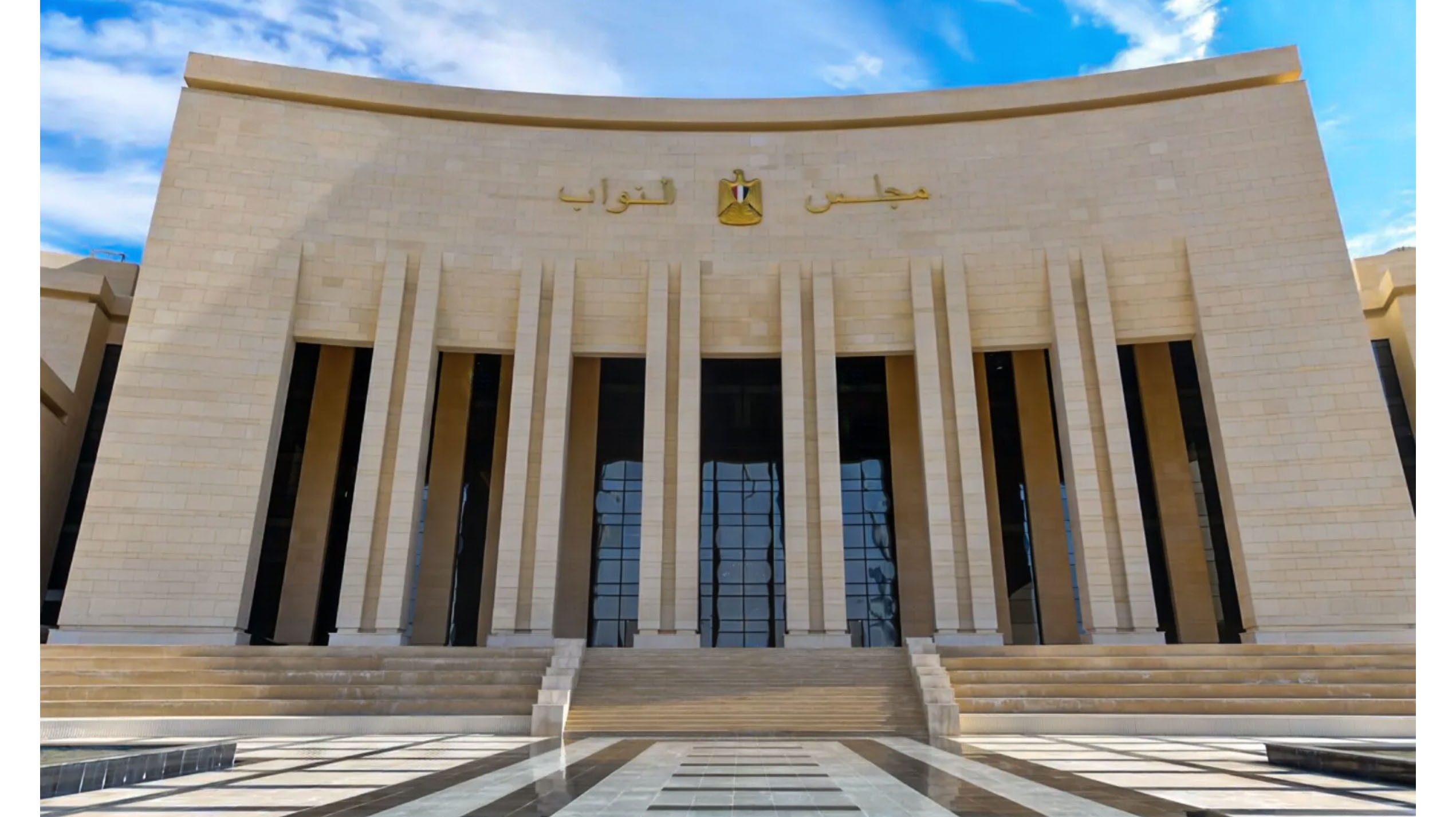 English content
English content

